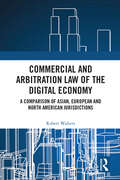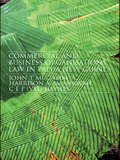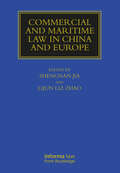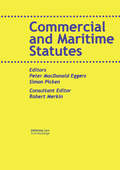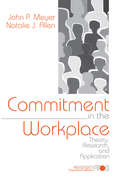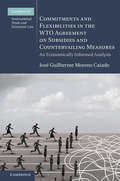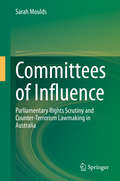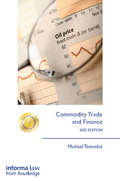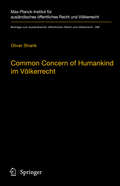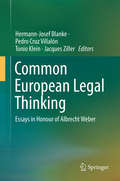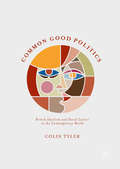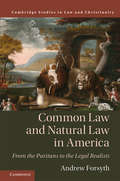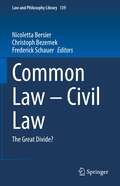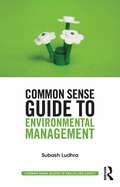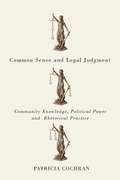- Table View
- List View
Commercial and Arbitration Law of the Digital Economy: A Comparison of Asian, European and North American Jurisdictions
by Robert WaltersThis book discusses the importance of the digital economy and its most pressing challenge: the onset of quantum and critical technology. It looks at how its implementation, either on its own or coupled with artificial intelligence, impacts commercial and arbitration law.International trade and investment are increasingly being integrated within national security policy and the law to protect the nation state. A failure to safeguard personal and commercial data will allow other state and non-state actors to set the rules that do not align with the values of the rule of law and transnational rules-based system. This book argues that it is necessary to establish a principles-based approach to governing the development and use of these technologies. Chapters touch on the application of smart contracts, arbitration, as well as mergers and acquisitions and their potential weaponisation in the digital economy due to their ability to transcend national security. Elements of intellectual property, particularly patents and trademarks, and how international legal instruments have directed national law-making are also explored.This is a useful reference for governments, regulators, legal, technologists and policy experts. This is also of interest to scholars looking at personal and commercial data in relation to intellectual property, contracts and international commercial arbitration law.
Commercial and Business Organizations Law in Papua New Guinea
by John Mugambwa Harrison Amankwah C.E.P. (Val) HaynesA timely and apposite treatise on Papua New Guinea’s economic environment, this book explores business organizations law and various aspects of commercial law in Papua New Guinea in a readable and informative style. Business and commerce is the twin engine that propels the economy of a modern nation. They ensure steady economic growth and development. In an age of globalization, they assume even greater importance than at any other time in human history. A nation risks being marginalized or left behind in the race for a share of the world economic market unless it ensures the stability of its business and commercial sector. Trade regulation, good governance and democratic institutions go hand in hand in guaranteeing political and social equilibrium. As such the laws designed to facilitate trade and commerce are a vital component of the political and social equation. This is a valuable book for law students, legal practitioners, accountants and business executives, not only within Papua New Guinea, but also in Australia and throughout the South Pacific.
Commercial and Maritime Law in China and Europe (Maritime and Transport Law Library)
by Shengnan Jia and Lijun Liz ZhaoBoth China and Europe have a long tradition of commercial and maritime law; and this new book examining various topics from their particular perspectives is both timely and important. It links the vital component of maritime law with commercial law, financial law and trade policy. The book has performed a remarkable task in making connections between China and Europe through the lenses of substantive and procedrual laws, covering a wide range of areas, including commercial law, insurance law, salvage, EU maritime law and Brexit, carriage of goods by sea, arbitration, mediation, litigation, the recently formed China International Commercial Court, and different liability regimes, as well as a brief look forward into new initiatives and artificial intelligence in the digital age. In these challenging times, we all have much to learn from each other in seeking to find answers to what are often difficult problems. This book provides a welcome opportunity for anyone interested in commercial and maritime law to engage in that learning exercise and, looking ahead, thereby to help solve such problems as may arise in the future – in a practical and fair manner. It is therefore of great relevance to both the academic field and the legal practice field in China and Europe.
Commercial and Maritime Statutes: Commercial And Maritime Statutes (Maritime and Transport Law Library)
by Peter MacDonald Eggers Simon PickenThis collection of statutes form a reference point for the maritime, commercial and insurance litigator. It covers 35 statutes, some with a commentary and list of key cases to aid with interpretation of the statute.
Commercial and Military Uses of Outer Space (Issues in Space)
by Melissa De Zwart Stacey HendersonThis edited book brings together a diverse range of chapters on space related topics. The authors included in this book are drawn from Australia and overseas, from academia, government, industry, civil society and the military. This book contains chapters that cover topics such as law, science, archaeology, defence, policy, and more, all with a focus on space. This edited collection is a timely international and interdisciplinary book, which addresses some of the contemporary issues facing activities in space and those attempting to understand, use and regulate the space domain. This edited book seeks to normalise the role of women as experts in the space sector, by not calling attention to the fact that all the authors are women – they are all experts in their respective fields who just happen to be women. Bringing together these contributions in this book in turn promotes the inclusion of diversity in the space sector. This edited collection is an opportunity to influence the development of the space industry – in terms of gender diversity, and diversity of disciplines and thinking – while it is in its formative stage, rather than trying to redress imbalances once they are entrenched in the industry.
Commercial law
by Saud AlremeithiRethinking and Reconfiguring the Anthropomorphic Concept of Corporate Personality Some Suggestions for Personality Needs in the Light of Corporate Development in Public Companies with a Particular Focus on the United Arab Emirates.
Commissions of Inquiry and Policy Change
by Gregory J. Inwood Carolyn M. JohnsCommissions of inquiry are a vital and ubiquitous part of the Canadian policy landscape. Established to answer the tough questions, they have been charged with examining almost every aspect of public life.This collection brings together leading Canadian scholars working in political science, public policy, and law to explore fundamental questions about the relationship between commissions of inquiry and public policy for the first time: What role do commissions play in policy change? Would policy change have happened without them? Why do some commissions result in policy changes while others do not?In search of answers, Commissions of Inquiry and Policy Change analyses ten landmark inquiries ranging across a variety of political, economic, social, cultural, environmental, and legal issues. Filling a significant gap in the literature, this volume will be a valuable resource for scholars and students of Canadian political science, public policy, law, and history, as well as a broader audience of readers interested in commissions of inquiry and their role in Canadian policymaking.
Commitment in the Workplace: Theory, Research, and Application (Advanced Topics in Organizational Behavior series)
by John P. Meyer Natalie J. AllenWhat is a committed employee? Are employees who are committed better or worse off than employees who are uncommitted? What are the organizational advantages and disadvantages of having a committed workforce? Commitment in the Workplace provides an overview of academic and popular perspectives on what committed employees look like and how they become committed. The multiple faces of commitment are examined as are the links that have been established between the various forms of commitment and organizational behavior. In addition, questions concerning individual differences, organizational characteristics, and work experiences associated with commitment are explored. The book concludes with a discussion of what organizations can do to manage commitment effectively, including commitment under more difficult circumstances, such as merger/acquisition, downsizing, and relocation. One of the great strengths of the book is that it summarizes the key organizational commitment research in such a way that the research findings can be evaluated for both their scientific merit and their practical value. The primary audience for Commitment in the Workplace includes students in MBA and executive MBA programs, researchers, and students and practitioners in the fields of organizational behavior and industrial psychology.
Commitments and Flexibilities in the WTO Agreement on Subsidies and Countervailing Measures: An Economically Informed Analysis (Cambridge International Trade and Economic Law)
by José Guilherme CaiadoThe ability of countries to promote and protect their domestic industries in the face of stiff global competition is an important consideration in any trading agreement. Member states of the World Trade Organization are expected to adhere to the WTO Agreement on Subsidies and Countervailing Measures, but to what extent do the WTO Members have policy space to subsidize their industries? Using an economically informed framework, Caiado examines the flexibilities countries may find at the WTO to grant subsidies and impose tariffs to protect designated industries. By testing the Treaty system of entitlements and enforcement mechanisms against the theory of incomplete contract, this work offers a comprehensive analysis of the capacity of the SCM Agreement to achieve its goal: the concomitant regulation of opportunistic behavior and assurance of ex post flexibility.
Committed to Rights: UN Human Rights Treaties and Legal Paths for Commitment and Compliance
by Audrey L. ComstockInternational treaties are the primary means for codifying global human rights standards. However, nation-states are able to make their own choices in how to legally commit to human rights treaties. A state commits to a treaty through four commitment acts: signature, ratification, accession, and succession. These acts signify diverging legal paths with distinct contexts and mechanisms for rights change reflecting legalization, negotiation, sovereignty, and domestic constraints. How a state moves through these actions determines how, when, and to what extent it will comply with the human rights treaties it commits to. Using legal, archival, and quantitative analysis this important book shows that disentangling legal paths to commitment reveals distinct and significant compliance outcomes. Legal context matters for human rights and has important implications for the conceptualization of treaty commitment, the consideration of non-binding commitment, and an optimistic outlook for the impact of human rights treaties.
Committed: A Rabble-rouser's Memoir
by Dan MathewsCommitted is a bold, offbeat, globe-trotting memoir that shows how the most ridiculed punching bag in high school became an internationally renowned crusader for the most downtrodden individuals of all -- animals. This irresistibly entertaining book recounts the random incidents and soul-searching that inspired a reluctant party boy to devote his life to a cause, without ever abandoning his sense of mischief and fun. "Everyone has a tense moment in their career that makes them wonder, how the hell did I get into this mess?" writes Mathews. "For me, it was when I was dressed as a carrot to promote vegetarianism outside an elementary school in Des Moines, and a pack of obese pig farmers showed up and peeled off slices of bologna for kids to throw at me." As the irreverent force behind the colorful crusades carried out by People for the Ethical Treatment of Animals (PETA), one of the most effective and enduring pressure groups in the world, Mathews has strutted naked before a fur convention in Tokyo, halted GM's use of animals in crash tests by storming the carmaker's float in the Rose Parade dressed as a rabbit, and crashed a fashion show in Milan dressed as a priest. With self-deprecating wit and candor, Mathews reveals all the edgy details of his unorthodox coming-of-age and equally outrageous career. With backdrops such as the rock scene in Hollywood and London, the inner sanctums of New York high fashion, jails in Hong Kong and Boston, and a psychiatric ward in Paris, Committed spotlights the adventures life can offer when you don't abandon your youthful ideals and imagination.
Committees of Influence: Parliamentary Rights Scrutiny and Counter-Terrorism Lawmaking in Australia
by Sarah MouldsThis book includes original and ground breaking research into parliamentary law making and legislative responses to counter-terrorism in Australia. This book introduces new, holistic and evidenced-based methods of evaluating how parliaments deliberate on complex policy issues, and how they weigh up competing rights and interests. Although this book is focused on the Australian experience, it has relevance across all parliamentary democracies grappling with the challenges posed by ensuring robust rights protection whilst responding to the threat of terrorism. This book will be of relevance and interest to law makers, government administrators and public servants, law enforcement and intelligence agencies, political and legal scholars, law students and members of the legal profession.This book is designed to provide a unique, evidence-based perspective on Australia's parliamentary model of rights protection and on the experience of counter-terrorism law making in Australia since 2011. By focusing on the role and impact of the federal parliamentary committee system, this book offers a fresh perspective on the contemporary legal and political debate on the best legal mechanism for rights protection in Australia. By using counter-terrorism laws as a detailed case study, this book also contributes in a timely, authoritative way to the debate on balancing individual liberties with national security. Using a contemporary case study of Australia's counter-terrorism, this book employs a unique, three tiered methodology to explore the impact of the system of parliamentary committees system on federal laws. The findings in this book give rise to practical recommendations for reform and provide a fresh new perspectives on Australia's parliamentary model of rights protection. This book has broad implications for rights scholars and rights advocates contemplating new models of rights protection in Australia. This book offers important practical insights to other jurisdictions grappling with the challenges posed by ensuring robust rights protection whilst responding to the threat of terrorism.
Commodified Communion: Eucharist, Consumer Culture, and the Practice of Everyday Life
by Antonio Eduardo AlonsoWINNER, 2021 HTI BOOK PRIZEResist! This exhortation animates a remarkable range of theological reflection on consumer culture in the United States. And for many theologians, the source and summit of Christian cultural resistance is the Eucharist. In Commodified Communion, Antonio Eduardo Alonso calls into question this dominant mode of theological reflection on contemporary consumerism. Reducing the work of theology to resistance and centering Christian hope in a Eucharist that might better support it, he argues, undermines our ability to talk about the activity of God within a consumer culture. By reframing the question in terms of God’s activity in and in spite of consumer culture, this book offers a lived theological account of consumer culture that recognizes not only its deceptions but also traces of truth in its broken promises and fallen hopes.
Commodity Activism: Cultural Resistance in Neoliberal Times (Critical Cultural Communication #21)
by Sarah Banet-Weiser Roopali MukherjeeBuying (RED) products—from Gap T-shirts to Apple—to fight AIDS. Drinking a “Caring Cup” of coffee at the Coffee Bean & Tea Leaf to support fair trade. Driving a Toyota Prius to fight global warming. All these commonplace activities point to a central feature of contemporary culture: the most common way we participate in social activism is by buying something. Roopali Mukherjee and Sarah Banet-Weiser have gathered an exemplary group of scholars to explore this new landscape through a series of case studies of “commodity activism.” Drawing from television, film, consumer activist campaigns, and cultures of celebrity and corporate patronage, the essays take up examples such as the Dove “Real Beauty” campaign, sex positive retail activism, ABC’s Extreme Home Makeover, and Angelina Jolie as multinational celebrity missionary.Exploring the complexities embedded in contemporary political activism, Commodity Activism reveals the workings of power and resistance as well as citizenship and subjectivity in the neoliberal era. Refusing to simply position politics in opposition to consumerism, this collection teases out the relationships between material cultures and political subjectivities, arguing that activism may itself be transforming into a branded commodity.
Commodity Trade and Finance (The Grammenos Library)
by Michael TamvakisWhat affects the supply of oil? How important is the weather in determining grain prices? Why has the price of copper skyrocketed? This unique book analyses the economics of key commodity groups, including energy, agriculture and metals. It examines the supply/demand fundamentals of several major and minor commodities, physical characteristics, production and consumption patterns, trade flows and pricing mechanisms. It also explains the main tools used to hedge price risk, such as futures, options and swaps. This second edition has been fully revised and restructured, and contains four new chapters, including oil refining, electricity and price risk management for energy, metals and agricultural commodities This book is an indispensable reference text for students, academics and those working in the commodity business.
Common Commercial Policy after Lisbon: Special Issue (European Yearbook of International Economic Law)
by Christoph Herrmann Marc BungenbergSince the beginning of the process of European integration the EU Common Commercial Policy (CCP) has been one of the most dynamic political fields. The EU has achieved a leading role among the economic superpowers and is regarded as a single economic area in which the EU speaks also on behalf of its Member States for most aspects of external economic politics. This volume analyzes the implications of the Treaty of Lisbon for the Common Commercial Policy of the EU. The Lisbon Treaty has declared all matters concerning external commercial policy as exclusive competences of the EU. Which consequences does this have for the Member States of the EU? With regard to institutional modifications, the Lisbon Treaty has significantly strengthened the role of the European Parliament and has substantially changed the role of the 'High Representative of the Union for Foreign Affairs and Security Policy' (HR). Further topics of this volume are the new normative framework of the CCP, inter alia the linkage of the CCP to the general objectives for the EU's external actions and its dependence on secondary legislation, as well as investment policy now being part of the CCP.
Common Concern of Humankind im Völkerrecht (Beiträge zum ausländischen öffentlichen Recht und Völkerrecht #289)
by Oliver StrankDieses Buch untersucht die philosophischen Grundlagen und die geschichtliche Entwicklung des common concern of humankind-Begriffs und seine Rechtswirkungen im Völkerrecht. Hierbei wird das Prinzip in den Bestand des Umweltvölkerrechts eingeordnet und sein Verhältnis zum Grundsatz der Staatensouveränität untersucht. Außerdem wird das common concern-Prinzip vom common heritage-Prinzip abgegrenzt und völkerrechtstheoretisch dargelegt, welche Wirkung es als Prinzip innerhalb und außerhalb der von ihm erfassten Regime entfaltet. Der Autor begründet, dass mit der Verankerung des common concern of humankind-Prinzips in der Klimarahmenkonvention und im Pariser Abkommen sowie in der Biodiversitätskonvention die dort enthaltenen Umweltschutzpflichten zu solchen gegenüber der Staatengemeinschaft als Ganzes geworden sind, sodass sich alle Vertragsstaaten - unabhängig von einer eigenen Betroffenheit - gegenüber allen anderen Vertragsstaaten auf ihre Erfüllung berufen können und eine Klagebefugnis vor dem Internationalen Gerichtshof haben.
Common European Legal Thinking: Essays in Honour of Albrecht Weber
by Hermann-Josef Blanke Pedro Cruz Villalón Tonio Klein Jacques ZillerCommon European Legal Thinking emanates from the existence of a shared European legal culture as especially reflected in the existence of a common European constitutional law. It denotes a body of individual constitutional principles - written and unwritten - that represent the common heritage of the constitutions of the Member States. Taking into account the two major European organisations, the Council of Europe and especially the European Union, the essays of this Festschrift discuss a range of constitutional principles, including the rule of law, democracy, and the exercise of political power in a multilevel system which recognises fundamental rights as directly applicable and supreme law. Other essays examine the value of pluralism, the commitment of private organisations to uphold public values, principles or rules, and the objectives and methods of a transnational science of administrative law. These articles highlight the fact that the Ius Publicum Europaeum Commune is "politically" in the making, which can often be seen in the shape of general legal principles. The publication recognises the role of Albrecht Weber as a forerunner of Common European Legal Thinking.
Common Good Politics: British Idealism and Social Justice in the Contemporary World
by Colin TylerThis book examines the British tradition of common good politics, both historically and in the contemporary world. We live in a time when many anti-Conservative parties and voters feel a profound sense of crisis and disorientation over political principles and policy directions. As a result, many people are turning to common good politics as an alternative to state-centred socialism and laissez-faire individualism. Colin Tyler explores the practical and intellectual history of the British idealist tradition, which flourished from the 1870s to the 1920s, before applying the principles of common good politics to contemporary issues. These issues include the positive roles that can be played by conflict within democratic societies, the radical demands of social justice in a diverse world, the continuing influence of Bush's 'war on terror', international society and free speech under Tony Blair and David Cameron, and the relationships between economic migration, social justice and the common good. The book will appeal particularly to students and scholars interested in British politics, internationalism and political theory.
Common Good and Self-Interest in Medieval and Early Modern Philosophy (The New Synthese Historical Library #78)
by Heikki Haara Juhana ToivanenThis open access volume provides an in-depth analysis of philosophical discussions concerning the common good and its relation to self-interest in the history of Western philosophy. The thirteen chapters explore both renowned and lesser-known thinkers from the Middle Ages to the eighteenth century, covering also the relevant ancient background. By bridging the gap between the medieval and early modern periods, they provide fresh insights into how moral and political philosophers understood the concepts of the common good and self-interest, along with their ethical and political implications. The concept of the common good occupies a central role in philosophical reflections on the public and private dimensions of moral and social life in contemporary debates. By exploring the rich and diverse ways in which the relationship between the common good and self-interest has been understood, this volume has the potential to contribute to our ongoing efforts to critically discern the possibilities and limitations of these concepts in the present. Thus, the volume will be useful for scholars interested in the multi-layered role of the notion of the common good both in the history of philosophy and in contemporary moral and political philosophy.
Common Law and Natural Law in America: From the Puritans to the Legal Realists (Law and Christianity)
by Andrew ForsythSpeaking to today's flourishing conversations on both law, morality, and religion, and the religious foundations of law, politics, and society, Common Law and Natural Law in America is an ambitious four-hundred-year narrative and fresh re-assessment of the varied American interactions of 'common law', the stuff of courtrooms, and 'natural law', a law built on human reason, nature, and the mind or will of God. It offers a counter-narrative to the dominant story of common law and natural law by drawing widely from theological and philosophical accounts of natural law, as well as primary and secondary work in legal and intellectual history. With consequences for today's natural-law proponents and critics alike, it explores the thought of the Puritans, Revolutionary Americans, and seminal legal figures including William Blackstone, Joseph Story, Christopher Columbus Langdell, Oliver Wendell Holmes, and the legal realists.
Common Law – Civil Law: The Great Divide? (Law and Philosophy Library #139)
by Frederick Schauer Christoph Bezemek Nicoletta BersierThis book offers an in-depth analysis of the differences between common law and civil law systems from various theoretical perspectives. Written by a global network of experts, it explores the topic against the background of a variety of legal traditions.Common law and civil law are typically presented as antagonistic players on a field claimed by diverse legal systems: the former being based on precedent set by judges in deciding cases before them; the latter being founded on a set of rules intended to govern the decisions of those applying them. Perceived in this manner, common law and civil law differ in terms of the (main) source(s) of law; who is to create them; who is (merely) to draw from them; and whether the law itself is pure each step of the way, or whether the law’s purity may be tarnished when confronted with a set of contingent facts. These differences have deep roots in (legal) history – roots that allow us to trace them back to distinct traditions. Nevertheless, it is questionable whether the divide thus depicted is as great as it may seem: international and supranational legal systems unconcerned by national peculiarities appear to level the playing field. A normative understanding of constitutions seems to grant ever-greater authority to High Court decisions based on thinly worded maxims in countries that adhere to the civil law tradition. The challenges contemporary regulation faces call for ever-more detailed statutes governing the decisions of judges in the common law tradition. These and similar observations demand a structural reassessment of the role of judges, the power of precedent, the limits of legislation and other features often thought to be so different in common and civil law systems. The book addresses this reassessment.
Common Legal Framework for Takeover Bids in Europe
by Dirk Van GervenThe Council Directive of 21 April 2004 on takeover bids sets forth the general principles applicable to takeover bids and clarifies certain minimum rules with respect to the procedure for a takeover bid, the obligation to make a mandatory bid in the event a minimum threshold is crossed and the majority shareholder's squeeze-out right as well as the minority shareholders' sell-out right. Furthermore, the Directive defines the authority which is competent to approve offer documents and supervise takeover bids, and provides for optional restrictions on the actions of the target company's management and on defence mechanisms. This book discusses the Takeover Directive and its implementing rules in each Member State of the European Union and the European Economic Area, providing companies and their advisors with useful insight into the legal framework and principles applicable to takeover bids in the region.
Common Sense Guide to Environmental Management
by Subash LudhraAn essential and short guide for those who need to know more about environmental management in the workplace without wanting to spend hours reading dozens of different documents. Whether it’s for use alongside a training course or simply to brush up on your knowledge, it’s perfect for equipping you with the principles of environmental management. Friendly and accessible, this Common Sense Guide covers all the main aspects of environmental management in manageable chapters to provide you with the knowledge and understanding you need to look after the environment and those around you. Suitable for those with little understanding of environmental management Includes questions at the end of each module to consolidate your environmental management knowledge Certificate offered to those who complete the exam at the end of the book and return to be marked externally.
Common Sense and Legal Judgment: Community Knowledge, Political Power, and Rhetorical Practice
by Patricia CochranWhat does it mean when a judge in a court of law uses the phrase “common sense”? Is it a type of evidence or a mode of reasoning? In a world characterized by material and political inequalities, whose common sense should inform the law? Common Sense and Legal Judgment explores this rhetorically powerful phrase, arguing that common sense, when invoked in political and legal discourses without adequate reflection, poses a threat to the quality and legitimacy of legal judgment. Often operating in the service of conservatism, populism, or majoritarianism, common sense can harbour stereotypes, reproduce unjust power relations, and silence marginalized people. Nevertheless, drawing the works of theorists such as Thomas Reid, Antonio Gramsci, and Hannah Arendt into conversation with rulings by the Supreme Court of Canada, Patricia Cochran demonstrates that with careful attention, the democratic, egalitarian, and community-sustaining aspects of common sense can be brought to light. A call for critical self-reflection and the close scrutiny of power relationships and social contexts, this book is a direct response to social justice predicaments and their confounding relationships to law. Creative and interdisciplinary, Common Sense and Legal Judgment reinvigorates feminist and anti-poverty understandings of judgment, knowledge, justice, and accountability.
